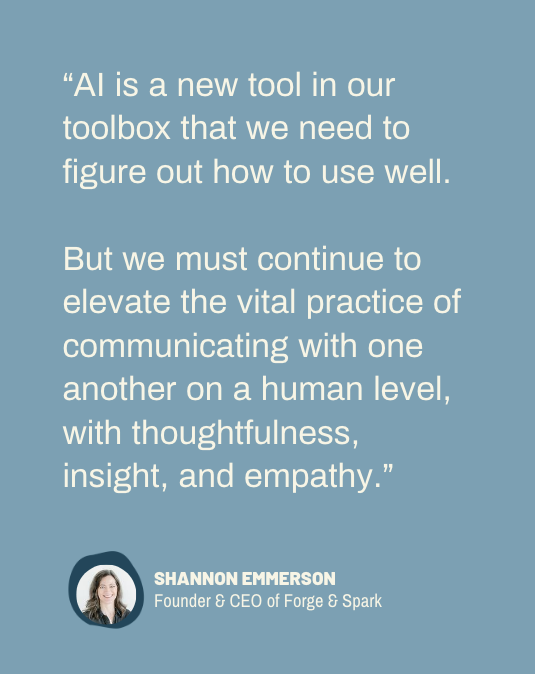ItŌĆÖs mighty tempting these days to use artificial intelligence tools like ChatGPT, Jasper, and Midjourney in creating content to market your business. But what about the question of content quality?
WhatŌĆÖs going to happen to content quality in the age of AI?
Everywhere I travelled this summer, people were talking about AIŌĆöand asking me, as the owner of a content agency, how I felt about it.
My feelings are complex. IŌĆÖve been awed by how quickly it ŌĆ£spits outŌĆØ words. And by how good those words sound ŌĆ” at first. But oh, it makes me nervous, too. As both a writer and the owner of a content marketing agency, it scares me that people might begin to rely exclusively on AI to generate their contentŌĆöthat they might not need me at all anymore.
I have a slew of questions, too. Is the world still going to need writers? Designers? Content creators? And what is going to happen to thoughtful, soulful, personalized writing and design?
What is going to happen to content quality?
IŌĆÖm afraid I donŌĆÖt have answers to all of these questions. But I do know this: content quality matters more than everŌĆöto audiences and search engines. Quality of thought will always matter to discerning audiences who are seeking out solutions to very real, very human problems in business and life. I also believe that strategic quality matters more than ever. After all, if weŌĆÖre going to live in a world of robots, we need to be very careful about what we tell them to do and how we teach them to do it.
The benefits of AI for content marketing
In our work as a content marketing agency, our chief job is to help clients achieve their business and marketing objectives by using the right content and channels. And a big part of our role as a content partner to purpose-driven clients is to educate and provide useful information to audiences, to grow awareness, and build trust and community.
Traditionally, weŌĆÖve done this by becoming exceptionally knowledgeable about the subjects weŌĆÖre covering. Many of us are experienced journalists who are trained to capture and communicate information about complex industries and topics. And in many cases, we cover the same topics, or ŌĆśbeatsŌĆÖ for years and even decades. We understand enough to speak and write knowledgeably. To have opinions.
And today, thereŌĆÖs AI. With its numerous benefitsŌĆöspeed, cost-effectiveness, tuning for SEO chief among the prosŌĆöAI-generated content is here to stay. And weŌĆÖre using it, too, in all kinds of ways, from helping our clients generate content ideas to quickly outlining articles and creating first-draft advertising copy. ItŌĆÖs helping us to become more efficient with some of the rote tasks weŌĆÖve previously handled ourselves. And for that, weŌĆÖre grateful ŌĆ” namely so that we can continue to focus more than ever on elevating our contentŌĆÖs quality.
Andy Crestodina of Orbit Media Studios recently hosted a fantastic webinar on Generative AI for Content Marketers. Within it, he highlighted this insight from Paul Roetzer, founder of the Marketing AI Institute: AI wonŌĆÖt replace marketers. Marketers who use AI will replace marketers who donŌĆÖt use AI.ŌĆØ
The webinar offered practical advice (and oodles of fun-to-experiment-with prompts) for content marketers interested in applying generative AI tools in their work. This observation particularly struck meŌĆöthat content creators and marketers really do have to get in the game to stay competitive … and relevant.
What it comes down to, for me, is that AI is a new tool in our toolbox that we need to figure out how to use well for our work, while we continue to elevate the vital practice of communicating with one another on a human level, with thoughtfulness, insight, and empathy.

The Question of Quality: What IS premium-quality content?
As an agency owner and veteran content marketing practitioner, I know how important it is to ensure that your content is not only consumed and appreciatedŌĆöthat it offers benefits and perhaps even a bit of delight to your readersŌĆöbut also eminently discoverable, and leading your audience to actions. Here, then, is my take on the key elements of premium-quality content today.
Expertise, experience, authoritativeness, and trustworthiness (EEAT)
IŌĆÖm going to start with the way Google looks at quality content. Because, well, they have a wee bit of power over us allŌĆöin terms of how our content shows up (or doesn’t) to the people we most want to see it. Google’s ranking systems currently gauge your contentŌĆÖs expertise, experience, authoritativeness, and trustworthiness to determine your contentŌĆÖs level of priority in search. But this is the most interesting bit. They currently employ actual humans to do this work rather than using AI, bots, or algorithms. And personally, IŌĆÖm on board.
After all, demonstrating oneŌĆÖs expertise is the crux of most content marketing. Show that you know your stuffŌĆöthrough content grounded in experience, knowledge, and insight, along with references to your credentials, experience, product, or service quality, and how your customers think of you (testimonials, reviews)ŌĆöand youŌĆÖre well on your way to elevating the quality of your content. And probably your thinking as well.
Showing your experience is the most recently added criteria in the Google ranking system, which I love. Simply put, they’ll rank a content piece lower when the author demonstrates that they donŌĆÖt know their stuff. Case in point: theyŌĆÖll demote a restaurant review written by someone who has never eaten there. That’s why, in your content, talk about your experienceŌĆöexactly why you know what youŌĆÖre talking about.
Authority is hard-won, certainly. But if youŌĆÖve got it, talk about it in your content. What Google means by authority is your reputation within your community, service/product area, or industry in general. TheyŌĆöand your audienceŌĆöwill prioritize and appreciate content that talks about and links to other media that mentions your brand, awards youŌĆÖve won, events youŌĆÖre a part of, courses youŌĆÖve offered, and other content youŌĆÖve published beyond your own site.
Trustworthiness generally means the reliability and credibility of your content ŌĆ” and it matters. To people and to Google. Technically, for Google, you can ŌĆśachieveŌĆÖ trustworthiness in your content (and rank more highly) by offering things like sources, links, and showing whoŌĆÖs writing your stuff. Yes, author bios do get rewarded by GoogleŌĆöand are appreciated by your readers, too.
The ŌĆśYou-NessŌĆÖ of it All
Google wonŌĆÖt reward your ŌĆ£you-ness.ŌĆØ But your audience will. When you can showŌĆöin your writing, topic selection, or unique take on a subjectŌĆöexactly how you stand out from competitors, then youŌĆÖre starting to cook. YouŌĆÖre starting to show up authentically. And what this does, miraculously, is make people see you as a standout. When youŌĆÖre competing against content that sounds like everything else, your uniqueness will always tip the balance in your favour.
Communicative Visual Impact (AKA: Clothes May Not Make the Person, but They Make You Feel Amaaaazing)
Visually engaging, well-crafted content makes people take notice. AndŌĆöquite simplyŌĆöit makes you seem more professional, established, and ŌĆ£premiumŌĆØ than others. Thoughtful content always encourages your audience to engage and take action. So whether that means exploring your content or downloading a useful resource, it can undoubtedly draw your audience closer.
Why Quality Content Matters to Google, Search in General, and You
Google rolled out an update in 2022 called the Helpful Content Update. This was to combat what they described as too much content ŌĆ£gamedŌĆØ for SEO and promote more “people-first content creation.ŌĆØ
Amazing, right?
The move signifies a shift toward helping you, as an audience, find truly helpful contentŌĆörather than stuff thatŌĆÖs written pretty much exclusively for you to find and then click on, yielding a benefit to the publisher, but NOT to you.
More recently, in its May 2023 core update, the company has moved to improve ŌĆ£how our systems assess content overall.ŌĆØ
How does that work, you might ask? First, a new ŌĆ£PerspectivesŌĆØ filter in Google is aimed at highlighting the relevant experiences of others in your search results. Second, the update aimed to surface ŌĆ£hidden gemsŌĆØ of content that were previously ignored.
In general, what you might remember when it comes to todayŌĆÖs quality-driven SEO is this: intend to do good with your content. By operating with the intent to, as Google puts it, ŌĆ£provide original, valuable content that offers a satisfying experience,ŌĆØ ideally producing content that ŌĆ£adheres closely to [your] area of expertise,” your content is golden in the eyes of Google.
Pro-tipŌĆötry this checklist next time before you publish anything:
- Ensure that your author byline is easy to find and further information about the author is easily accessible.
- Make it clear, whenever you can, how your content was created. Yep, this includes coming clean when youŌĆÖve used AI tools. Perhaps, you can also include evidence, like links and sources, to substantiate the information youŌĆÖre providing.
- Make it clear how this content is helpful for your audience. This might include simply adding a line or two about why youŌĆÖre creating the content, what benefit you hope your audience will get from it, and what kinds of problems it can help solve.
No matter how you create your content, focus on quality
In content marketing, and in business more generally, your audience is the North Star. You must care what they want, need, and think. That way, you can grow awareness, build trust, and drive those targeted actions and sales you seek.
And thankfully, at least for now, GoogleŌĆÖs business model is also focused on responding to their usersŌĆÖ (and your audienceŌĆÖs) queries by delivering the best quality articles and websites. This is how theyŌĆÖre going to retain their own customers in an age of increased competition in the search market.
So no matter whether you choose to use AI in your content creation, or develop your content using good olŌĆÖ fashioned human brains, what we suggest is this: good intentions, supported by execution with care. The intention to serve your audience with genuinely helpful, delightful, beautiful content IS the start. Following that up with well-researched, well-produced content that shouts out whoŌĆÖs creating it and why IS the way.
Questions about how you might craft higher-quality content for your organization or brand? We help with all stages of the content marketing journey. Reach out to us at hello[AT]forgeandspark.com.┬Ā













